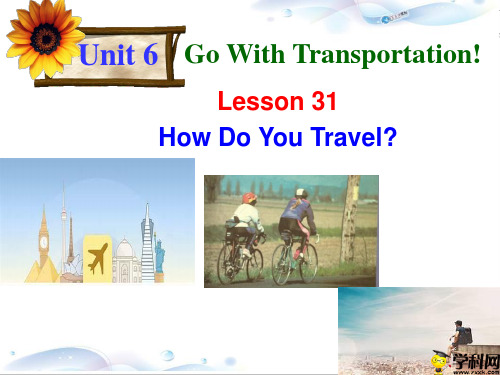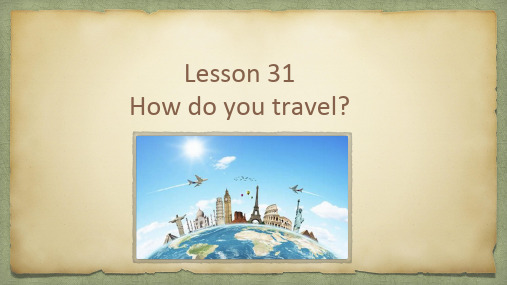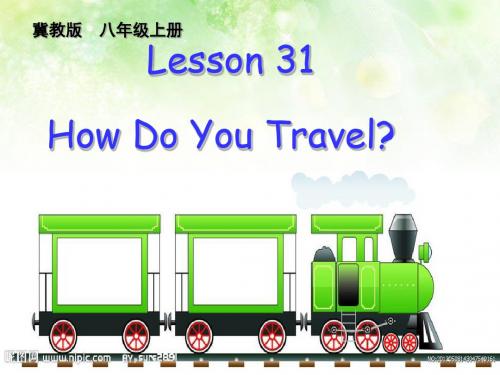Lesson31 (冀教版八年级英语上册Lesson31课件)
合集下载
冀教初中八年级上册英语《Lesson 31 How Do You Travel 》PPT课件 (2)

C
C. another
D. other
3. Heseldomtravelledbyplane, ______?
A. didhe
B. didn'the
A
C. ishe
D. doesn'the
Homework
SupposeyouaregoingtothebookstorethisSun day, orthatyouandyourclassmatesaregoingtoafa r-awayplace. Discusswiththemhowyouwillgetthere.
Lesson31 HowDoYouTravel?
I. Learningaims:
1. Learntheinformationaboutthetransportation. 2. Knowthetransportationhistoryandwhatthefuturetr ansportationwillbelike.
Ilikerapidtransportation, too. 我也喜欢快的交通方式。
rapidadj. 快的,迅速的,动作快的。如:
arapidcurrent急流arapidmarch急行军
辨 析
rapid, fast与quickly
rapid是形容词,在句中常作定语。
Tom is a rapid worker. 汤姆是个做事麻利的工人。
transportation
ThinkAboutIt!
●Howdoyoutravelinyourcity, townorvillage? ●What’syourfavoritetypeoftransportation?
Language Points
冀教版八年级英语上册Lesson31【课件】

school. I can walk to the park. I can walk to your house. ▪ B: You can walk to the bakery to buy donuts! What about going to
other cities? Could you go to another city on foot? ▪ D: Of course not. That would be too far. I could take a car! ▪ J: I like to take a train to other cities. I love riding the train. It’s my
2. I can go almost anywhere on foot. 我几乎能步行去任何地方。 1) almost adv. 几乎,差不多 Mum slept almost the whole way. 妈妈几乎一路都在睡觉。 辨析:almost与nearly almost与nearly都有“几乎,差不多”的意思,一般说来,almost比
工具前也可以用物主代词来修饰。如:
He goes to school by bike every day. 他每天骑他的自行车上学。
4. What about going to other cities? 但是去其他城市呢?
other在句中译为“别的,其他的”。
1) adj.“别的,其他的”。作定语,后面可以接单数名词、 复数名词和不可数名词,前面可以用some, any等词修 饰。
右拐,你会找到的。
辨析:across与through
across表示从物体的表面横穿过去。如: There is a bridge across the river. 有一座桥横跨这条
other cities? Could you go to another city on foot? ▪ D: Of course not. That would be too far. I could take a car! ▪ J: I like to take a train to other cities. I love riding the train. It’s my
2. I can go almost anywhere on foot. 我几乎能步行去任何地方。 1) almost adv. 几乎,差不多 Mum slept almost the whole way. 妈妈几乎一路都在睡觉。 辨析:almost与nearly almost与nearly都有“几乎,差不多”的意思,一般说来,almost比
工具前也可以用物主代词来修饰。如:
He goes to school by bike every day. 他每天骑他的自行车上学。
4. What about going to other cities? 但是去其他城市呢?
other在句中译为“别的,其他的”。
1) adj.“别的,其他的”。作定语,后面可以接单数名词、 复数名词和不可数名词,前面可以用some, any等词修 饰。
右拐,你会找到的。
辨析:across与through
across表示从物体的表面横穿过去。如: There is a bridge across the river. 有一座桥横跨这条
河北省保定市冀英学校八年级英语上册:lesson31HowDoYouTravel课件(共17张PPT)

Let us go another day. 改天
2. London is across the ocean.
across是介词, “在……的另一边, 在……的对面”。
①The library is just across the road. 图书馆就在马路对面。 ②There’s a bank right across the street. 街对面就有一家银行。
Unit 6 Go With Transportation!
Lesson 31 How Do You Travel?
单击播放录音
transportation hometown Britain seldom rapid
n. 运输,交通 n. 故乡,家乡 英国 adv. 罕见,难得 adj. 快速的rapidly
4. I seldom travel by ship.
seldom为程度副词,意思是“很少,不常, 难得”,用在陈述句中,表否定含义。 ①Tom seldom goes to school late.
②He seldom goes to the library on weekdays.
③I seldom heard of her last year. 。workhard努力 难的 hardly 几乎不 =seldom
Task 4
Fill in the blanks and try to retell. Jenny, Danny and Brain are talking about
their favourite _______t_y_p_e_s_o_f_t_r_a_n_s_p_o_r.tation Danny likes to walk. She can go almost _a_n_y_w_h_e_r_e on foot. Jenny likes to take a train. She loves riding the train. Brain thinks he couldn’t take the train to London __t_o_v_i_s_it__ his parents. Because London is a_c_r_o_s_s_t_h_e_o_c_e_a_n_. It would take ritain by ship. So he _s_e_ld__o_m__ travels by ship. He likes travelling _b_y_p_l_a_n_e_. Plane is really a _r_a_p_i_d transportation.
2. London is across the ocean.
across是介词, “在……的另一边, 在……的对面”。
①The library is just across the road. 图书馆就在马路对面。 ②There’s a bank right across the street. 街对面就有一家银行。
Unit 6 Go With Transportation!
Lesson 31 How Do You Travel?
单击播放录音
transportation hometown Britain seldom rapid
n. 运输,交通 n. 故乡,家乡 英国 adv. 罕见,难得 adj. 快速的rapidly
4. I seldom travel by ship.
seldom为程度副词,意思是“很少,不常, 难得”,用在陈述句中,表否定含义。 ①Tom seldom goes to school late.
②He seldom goes to the library on weekdays.
③I seldom heard of her last year. 。workhard努力 难的 hardly 几乎不 =seldom
Task 4
Fill in the blanks and try to retell. Jenny, Danny and Brain are talking about
their favourite _______t_y_p_e_s_o_f_t_r_a_n_s_p_o_r.tation Danny likes to walk. She can go almost _a_n_y_w_h_e_r_e on foot. Jenny likes to take a train. She loves riding the train. Brain thinks he couldn’t take the train to London __t_o_v_i_s_it__ his parents. Because London is a_c_r_o_s_s_t_h_e_o_c_e_a_n_. It would take ritain by ship. So he _s_e_ld__o_m__ travels by ship. He likes travelling _b_y_p_l_a_n_e_. Plane is really a _r_a_p_i_d transportation.
冀教版英语八年级上册 第31课 课件

How far is it from here to your school? 从这到你们学校有多远?
He waited from one o’clock to half past two. 他从一点等到两点半。
from相关的短语: be/come from 来自…… far away from 离……远 from time to time 不时,有时 stop...from 阻止…… be different from 不同于…… from now/then on 从现在/那时起
—Hi,Bob!I can't find my English book. Have you seen it ________B? —Sorry,I haven't. Why don't you ask Tom?Maybe he's seen it.
A.somewhere B.everywhere C.nowhere D.anywhere
anywhere /'eniweə(r)/ adv.在任何地方
I can sleep anywhere. 我在哪里都能睡。 You can't go anywhere today. You must stay at home.
今天你什么地方都不能去。你必须呆在家里。
拓展
everywhere通常用于肯定句中,意为“每个地方,到处”; somewhere在(到)某处; nowhere 无处,任何地方都不。
He seldom do exercise .他很少运动。
①书面语中,seldom,hardly等否定意义的词置于句首时,句 子要部分倒装,助动词或be动词提前。 eg:Seldom does he go to the library.
He waited from one o’clock to half past two. 他从一点等到两点半。
from相关的短语: be/come from 来自…… far away from 离……远 from time to time 不时,有时 stop...from 阻止…… be different from 不同于…… from now/then on 从现在/那时起
—Hi,Bob!I can't find my English book. Have you seen it ________B? —Sorry,I haven't. Why don't you ask Tom?Maybe he's seen it.
A.somewhere B.everywhere C.nowhere D.anywhere
anywhere /'eniweə(r)/ adv.在任何地方
I can sleep anywhere. 我在哪里都能睡。 You can't go anywhere today. You must stay at home.
今天你什么地方都不能去。你必须呆在家里。
拓展
everywhere通常用于肯定句中,意为“每个地方,到处”; somewhere在(到)某处; nowhere 无处,任何地方都不。
He seldom do exercise .他很少运动。
①书面语中,seldom,hardly等否定意义的词置于句首时,句 子要部分倒装,助动词或be动词提前。 eg:Seldom does he go to the library.
冀教版八年级英语上册课件:lesson 31

It is Brian’s hometown. He likes travelling by plane.
Watch the flash of Lesson 31 and answer:
How does Brain seldom travel? _B_y_s_h_ip_._______________________.
Tasks: 1.(请找出本文的主题句)
___C_a_r_s _a_r_e_a_n__im_p_o_r_t_an_t__p_a_rt__o_f_l_if_e_i_n_t_h_e__U_._S_. _____.
Cars are an important part of life in the U.S. There are three reasons the car became so popular in the U.S. First of all, the country is a huge one and Americans like to move around. The car provides(提供)the most comfortable and cheapest form of transportation. The second reason is that the United States never really developed an efficient(有效的)and cheap form of public transportation. Long-distance trains have never been as common in the United States as they are in other parts of the world. Tasks:
Watch the flash of Lesson 31 and answer:
How does Brain seldom travel? _B_y_s_h_ip_._______________________.
Tasks: 1.(请找出本文的主题句)
___C_a_r_s _a_r_e_a_n__im_p_o_r_t_an_t__p_a_rt__o_f_l_if_e_i_n_t_h_e__U_._S_. _____.
Cars are an important part of life in the U.S. There are three reasons the car became so popular in the U.S. First of all, the country is a huge one and Americans like to move around. The car provides(提供)the most comfortable and cheapest form of transportation. The second reason is that the United States never really developed an efficient(有效的)and cheap form of public transportation. Long-distance trains have never been as common in the United States as they are in other parts of the world. Tasks:
冀教版初中英语八年级上册U6 Lesson 31PPT课件

He gets to school on foot every day. 他每天步行到学校。
【拓展】 使用交通工具的表达方式:
a. 动词表达法。如walk(步行), ride(骑), take(乘)等。
e.g. I ride my bike to school every day. 我每天骑自行车上学。 He is going to take a bus to the city. 他要乘公共汽车去城里。
2. Key sentences: You can walk to the bakery to buy donuts. You could take a ship to your hometown! Of course, but it would take a long time to go from Canada to Britain. I seldom travel by ship. 3. 学习动词不定式的用法。
.
How do you go to……?
Language Points
1. ... it would take a long time to go from Canada to Britain.
take:常表示花时间; It takes sb. some time to do sth. 花费某人一些时间做某事。
学练优英语教学课件
It’s fun! It’s easy!
八年级(上)
冀教版
Unit 6
学练优八年级英语上(JJ) 教学课件
Go with Transportation!
Lesson 31
UNIT 6
Lesson 31 How Do You Travel?
学习目标
【拓展】 使用交通工具的表达方式:
a. 动词表达法。如walk(步行), ride(骑), take(乘)等。
e.g. I ride my bike to school every day. 我每天骑自行车上学。 He is going to take a bus to the city. 他要乘公共汽车去城里。
2. Key sentences: You can walk to the bakery to buy donuts. You could take a ship to your hometown! Of course, but it would take a long time to go from Canada to Britain. I seldom travel by ship. 3. 学习动词不定式的用法。
.
How do you go to……?
Language Points
1. ... it would take a long time to go from Canada to Britain.
take:常表示花时间; It takes sb. some time to do sth. 花费某人一些时间做某事。
学练优英语教学课件
It’s fun! It’s easy!
八年级(上)
冀教版
Unit 6
学练优八年级英语上(JJ) 教学课件
Go with Transportation!
Lesson 31
UNIT 6
Lesson 31 How Do You Travel?
学习目标
- 1、下载文档前请自行甄别文档内容的完整性,平台不提供额外的编辑、内容补充、找答案等附加服务。
- 2、"仅部分预览"的文档,不可在线预览部分如存在完整性等问题,可反馈申请退款(可完整预览的文档不适用该条件!)。
- 3、如文档侵犯您的权益,请联系客服反馈,我们会尽快为您处理(人工客服工作时间:9:00-18:30)。
until 也可用作介词。
They worked until ten o’clock in the evening.
A task: Act out your dialogues about asking for directions and giving directions.
New words
D 2. She is teaching _________ English. A. I and Jenny B. Jenny and I
C. me and Jenny
D. Jenny and me
C 3. I ______ to Beijing when you get back.
A. go B. went
It’s easy/hard to do sth.
1) 骑自行车很容易。
It’s easy to ride a bike.
2) 学好英语很难。
It’s hard to learn English well.
3) 住在一个新社区不总是很容易。
It isn’t always easy to live in a new neighbourhood.
1. truth n. 2. flu n. 3. mile n. 4. David 5. opposite prep. & n. 6. cinema n. 6. movie theatre 7. keep v. 7.(kept, kept)
1. true adj 2. have a flu have a cold catch a cold
汉译英:
I will be glad/sad/ happy when …
1) 她来北海,我会很高兴。
I will be very glad when she comes to Beihai.
2) 他不给我写信,我会很伤心。
I will be very sad when he doesn’t write to me.
Lesson 31 I Need a Map
1. see/watch a movie see/watch a film go to the cinema 2. a piece of paper two pieces of paper
3.Go straight down the street. 4. the wrong park 5. arrive at + 小地方 6.be/get lost arrive in + 大地方
5. What happened to him yesterday?
6. What is Brian going to do tomorrow?
7. How was Thanksgiving to Brian?
8. How does Brian miss his mom and dad?
Read carefully and answer the questions: 1. What did Jenny and Brian do on Monday? 2. What places did they pass/go past on their way to school?
fun Canadian
______ 6. I met all of my Canada cousins.
7. I will be glad when you will come to Canada, too. come _______
选择最佳答案: C 1. I borrowed a book from the library. I will ______ it seven days. A. borrow B. take C. keep D. try
7. Where will he keep it? Why?
Language notes:
1. I’m doing very well.
2. get to know
用进行时态强调“一直,一向”
强调“从不认识到认识的渐进过程”
know “认识,了解,知道” How did you get to know her? “ 注重过程” How do you know her? It’s easy/hard to do sth. 4. keep -- kept -- kept keep sb./sth. + 地方
1. until = till 作连词,引导时间状语从句。 主句如果是肯定句,谓语动词须是延续性动词。 They worked until everyone was tired. 主句是否定句,谓语动词须是瞬间动词。
not … until …
译为“直到……才”
They didn’t stop working until I came.
Speaking
Read quickly and answer the questions: 1. Who wrote the letter? 2. Who did the boy write the letter to?
3. How is Brian working at school?
4. What did Brian do this week?
C. will go
D. was going
D 4. I will tell him when he ________ tomorrow.
A. come B. will come
C. coming
D. comes
“含有意外、惊奇的意味”
3. It isn’t always easy to live in a new neighbourhood.
5. I will be glad when you come to Canada, too. I will be glad/sad/ happy when …
汉译英:
__ 3. She showed her favourite places for me.
to to buy
4. Tomorrow I’m going to ask Uncle David buy me a map. ___
5. Thanksgiving was a lot of funs. ___
3) 你忘记我,我不会不高兴。 I will not be sad when you forget me.
Correct the mistakes: 1. I am doing very good. _______ very well
2. I________ walked to school on Monday. Jenny and I and Jenny
3.ห้องสมุดไป่ตู้What is near their house?
4. Where was Brian going to meet Danny yesterday?
5. Did he lose his way? Who helped him?
6. What will Brian ask Uncle David to buy tomorrow?
